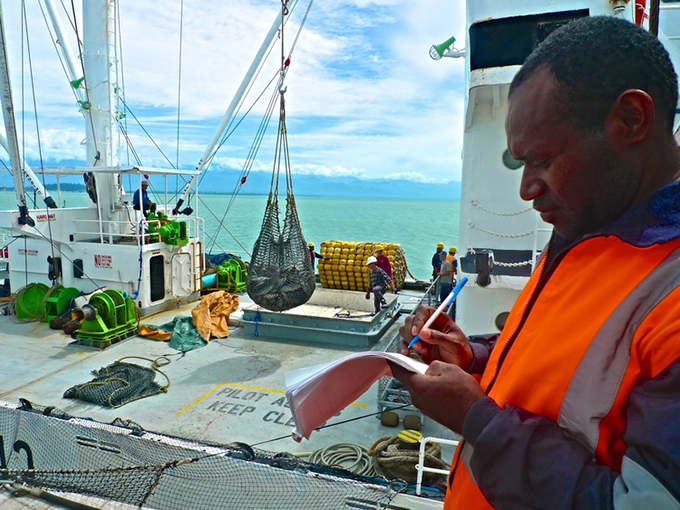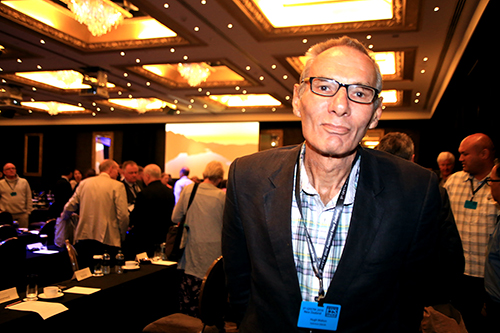
By Lealaiauloto Fatu Tauafiafi in Auckland
Seventeen Pacific island countries, including New Zealand and its territory Tokelau, will have the results of a Pacific-wide study revealing the real value of lost annual revenue in the Pacific’s US$6-7 billion fishery through illegal, unreported and unregulated fishing.
The results of the two-year study: Towards the Quantification of Illegal, Unreported and Unregulated (IUU) Fishing in the Pacific Islands Region, coordinated by the Forum Fisheries Agency will be reported to countries in a closed session tomorrow as part of FFA’s 19th Monitoring, Control and Surveillance Working Group meeting held in Auckland, New Zealand.
The FFA sessions follow on from two other key MCS events hosted in Auckland this month.
Discussion by the MCS working group officials will be followed by the report’s public debut at a media launch with FFA’s Director-General James Movick, Tuvalu’s Minister for Works and Natural Resources Pita Elisala, and the report’s author, MRAG’s Duncan Souter taking questions.
“This is the first time that the Pacific countries, through FFA have been in a position to determine the type and scope of such a review,” said FFA’s Movick.
“The study itself provides a clearer sense of what the main IUU risks are, what is working, and what needs additional priority when it comes to ensuring tuna vessels in Pacific waters are complying with the rules.”
At the core of the report is for the first time, being able to speicifically quantify the nature and extent of IUU fishing in the Pacific region’s fishery.
Planning with confidence
What that means at the street-level is the information in the report will help Pacific countries plan with confidence against losses through more effective stock assessments and stronger MCS responses.
Importantly, says FFA, the report provides the most reliable and current estimate, which puts to rest previously touted guesses totalling up to US$1.5 billion.
The Federated States of Micronesia has applauded FFA’s initiative in putting together the report. Attending the meeting, Susan Lowe-Gallen, FSM’s Chief of Compliance says the report is a game changer and sees two main impacts the region needs to take note.
First it elevates the Pacific to be one of the leading forces in the fight against IUU tuna fishing globally, “I don’t think any other region in the world has that [study] at this point,” she said.
She admits the numbers would not be absolute but “it gives us a better sense, a better estimate for the Pacific overall. In that regard we are slightly ahead of the game.”
But that follows up with a warning and the second impact that might hit the region as a result of the study.
“We don’t want decisions that end up going to the FAO [UN Food and Agricultural Organisation] or IMCS [International MCS Network] or anyone else that would could generate things such as frameworks or initiatives that would actually set the Pacific back a step from where we already are.
‘More at stake’
“We’re working hard and we’re trying our best to ensure that we don’t end up like a lot of those countries in Europe and Africa. We have a lot more at stake because for the majority of our countries, fisheries is all they have –we don’t have anything else so we have a little bit more at stake than many others.”
It is already a moot point that the majority of Pacific countries agree it is the “Unreported ‘U’” in IUU that is an area of weakness in current MCS efforts.
Samoa points to the absence of independent catch monitoring and verification in the longline sector as major weakness and therefore needs more attention for a mitigation upgrade.
“Very importantly, this report will set a definitive baseline for the scale, composition and quantified value on IUU fishing and what it is costing this region, against which future success can be measured,” said Movick.
“It will also help to provide a clearer basis to assess what is working and what needs reworking to ensure that collective regional efforts are targeted toward the most prevalent and costly forms of IUU in the evolving Pacific tuna fishery.”
And that is exactly one of the major roles the study is expected to provide.
It will provide evidential support for IUU mitigation management measures.
‘Don’t have ammunition’

According to Hugh Walton, FFA’s project manager for the EU-funded DEVFISH II programme, which coordinated the study, the report will allow discussion on mitigation measures “because we already know what they are but we don’t have the ammunition for them.
“We’re hoping that this report will give us the ammunition, say management measures in the Western and Central Pacific Fisheries Commission (WCPFC) sense, then for us at the regional level in terms on how we focus our MCS activities and then at the national level, in terms of our national level MCS activities, how they are focused.”
He cited as an example one of the MCS tools currently being discussed, e-monitoring and e-reporting in terms of the “U” for unreported.
“When you look at the e-monitoring and e-reporting tools in terms of the unreported, the camera doesn’t lie. In the trials we’ve done, we have done enough to know that the camera doesn’t lie.
“What that means is if you have a history of being a compliant vessel then I don’t need to worry too much about you. But if you rate on my compliance register over here [risk] – then that says I’m going to make you carry this camera – ideally. And there are, potentially, quite accessible mechanisms to focus on some of these risk areas. And tools are available and evolving to assist in that focus.”
Essentially, Walton added, “we are saying that this stuff is here, it’s now, and what it means is a change in the way we run our organisations and our national administrations.
“We don’t enter data anymore, we’ve got real time data that we can analyse and act on the analysis. So essentially we are moving towards a paradigm shift in the way organisations work.”
Frontline improvement
At the frontline of improving the management of the Pacific’s fishery are MCS practitioners.
Their efforts are guided by a newly endorsed “Fisheries Roadmap” that talks about increasing employment, revenue and economic returns to Pacific countries while ensuring sustainability of the tuna resource.
The MCS framework and the IUU work that forms a key part of it are all about ensuring there is tuna today and tomorrow- but it is a known fact that many times, decision-makers come up with things at very high superficial level without knowing what the reality is on the ground.
Which means that to deliver on the aspirations of, say, the Pacific Roadmap; and aligning them to the reality facing MCS practitioners is about the mechanisms needed to be put in place that will facilitate meeting some of those ambitious targets.
It means the support mechanisms will need to be built around what needs to be done to hit some of those targets – and the study being launched tomorrow will provide some of the building blocks to meet those ends.












































[…] Pacific-wide study tipped to show ‘real value’ of lost fisheries […]
Comments are closed.